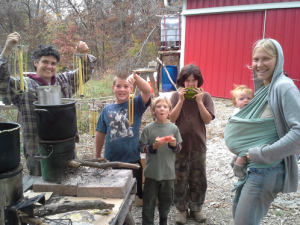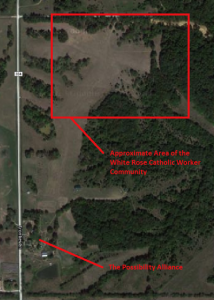
 First Winter in La Plata
The changing seasons pose a challenge to the White Rose’s operations. According to the White Rose newsletter, its highest source of income, besides donations, comes from selling farm-grown food at the farmers market. That cannot be done once the ground freezes during the middle of November.
Bambrick-Rust says the organization does not want to stop accommodating the people living there and will continue to provide overnight hospitality from one day to six months or longer if necessary
”We’re still open to visitors in the winter,” Bambrick-Rust says. “If someone’s out on the street, we usually find that we can fit one more.”
Until the organization can build more infrastructure, the farm offers plenty of space for visitors to camp in tents. Bambrick-Rust and his family plan to continue living on the farm in the cabin, provided they finish necessary construction work.
The family and visitors currently are gathering firewood and making candles in preparation for winter. Bambrick-Rust says the residents are working on the construction of the cabin, which mainly involves insulating the walls to prepare for the coming winter.
Bambrick-Rust says he and his family intend to talk to neighbors and friends and find out what people in the community need during the winter months, whether it be food, shelter or skills, and do their best to fulfill those needs.
Current Operations
Joe Jenkins, a Chicago native and current White Rose resident, says some visitors come to the farm because they are interested in becoming more involved with organic farming.
Jenkins heard about the White Rose community online though an organization called World Wide Opportunities on Organic Farms. He says he decided to come to the farm to learn more about sustainable living and construction, despite the fact he had never lived in this kind of a community before.
“It seemed like something positive I would want to get involved in,” Jenkins says.
Jenkins says he plans to continue to live on the farm until about Thanksgiving, and he says he likely will return in the future.
Some visitors are less economically fortunate. These visitors, many of whom are homeless, are learning how to provide for themselves through farming and other practices.
“I was surprised at how easy it was to adapt to living without electricity and running water,” Jenkins says. “I think we don’t always need all the things we think we need.”
First Winter in La Plata
The changing seasons pose a challenge to the White Rose’s operations. According to the White Rose newsletter, its highest source of income, besides donations, comes from selling farm-grown food at the farmers market. That cannot be done once the ground freezes during the middle of November.
Bambrick-Rust says the organization does not want to stop accommodating the people living there and will continue to provide overnight hospitality from one day to six months or longer if necessary
”We’re still open to visitors in the winter,” Bambrick-Rust says. “If someone’s out on the street, we usually find that we can fit one more.”
Until the organization can build more infrastructure, the farm offers plenty of space for visitors to camp in tents. Bambrick-Rust and his family plan to continue living on the farm in the cabin, provided they finish necessary construction work.
The family and visitors currently are gathering firewood and making candles in preparation for winter. Bambrick-Rust says the residents are working on the construction of the cabin, which mainly involves insulating the walls to prepare for the coming winter.
Bambrick-Rust says he and his family intend to talk to neighbors and friends and find out what people in the community need during the winter months, whether it be food, shelter or skills, and do their best to fulfill those needs.
Current Operations
Joe Jenkins, a Chicago native and current White Rose resident, says some visitors come to the farm because they are interested in becoming more involved with organic farming.
Jenkins heard about the White Rose community online though an organization called World Wide Opportunities on Organic Farms. He says he decided to come to the farm to learn more about sustainable living and construction, despite the fact he had never lived in this kind of a community before.
“It seemed like something positive I would want to get involved in,” Jenkins says.
Jenkins says he plans to continue to live on the farm until about Thanksgiving, and he says he likely will return in the future.
Some visitors are less economically fortunate. These visitors, many of whom are homeless, are learning how to provide for themselves through farming and other practices.
“I was surprised at how easy it was to adapt to living without electricity and running water,” Jenkins says. “I think we don’t always need all the things we think we need.”
Origins
The Catholic Worker movement was founded in New York City during 1933 by Dorothy Day. It is a network of about 240 houses and farms across the United States dedicated to serving those in need. The movement is interfaith and ecumenical, Bambrick-Rust says, and seeks to emulate the life of Jesus Christ through a life of poverty, service to others, and a challenging of the dominant religious and political authorities.
The White Rose branch of the Catholic Worker movement began in Chicago during 2009 while Bambrick-Rust was pursuing his masters degree in Ministry at Loyola University.
After hearing about and becoming intrigued by the idea of a land and craft-based society, Bambrick-Rust started a garden in his Chicago neighborhood.
Along with two partners, Jerica Arents and Jake Ozlen, Bambrick-Rust’s operation expanded to a farm south of Chicago, according to Marquette University’s alumni magazine.
Bambrick-Rust and his wife Regina later were invited by the Possibility Alliance to move a branch of the White Rose to La Plata.
“We certainly did not imagine that would lead us to be living without electricity in rural Missouri,” Bambrick-Rust says.
Bambrick-Rust, his wife and their infant daughter, Johanna, live on the land semi-permanently, either in camping tents or, when the weather gets cold, in the workshop.